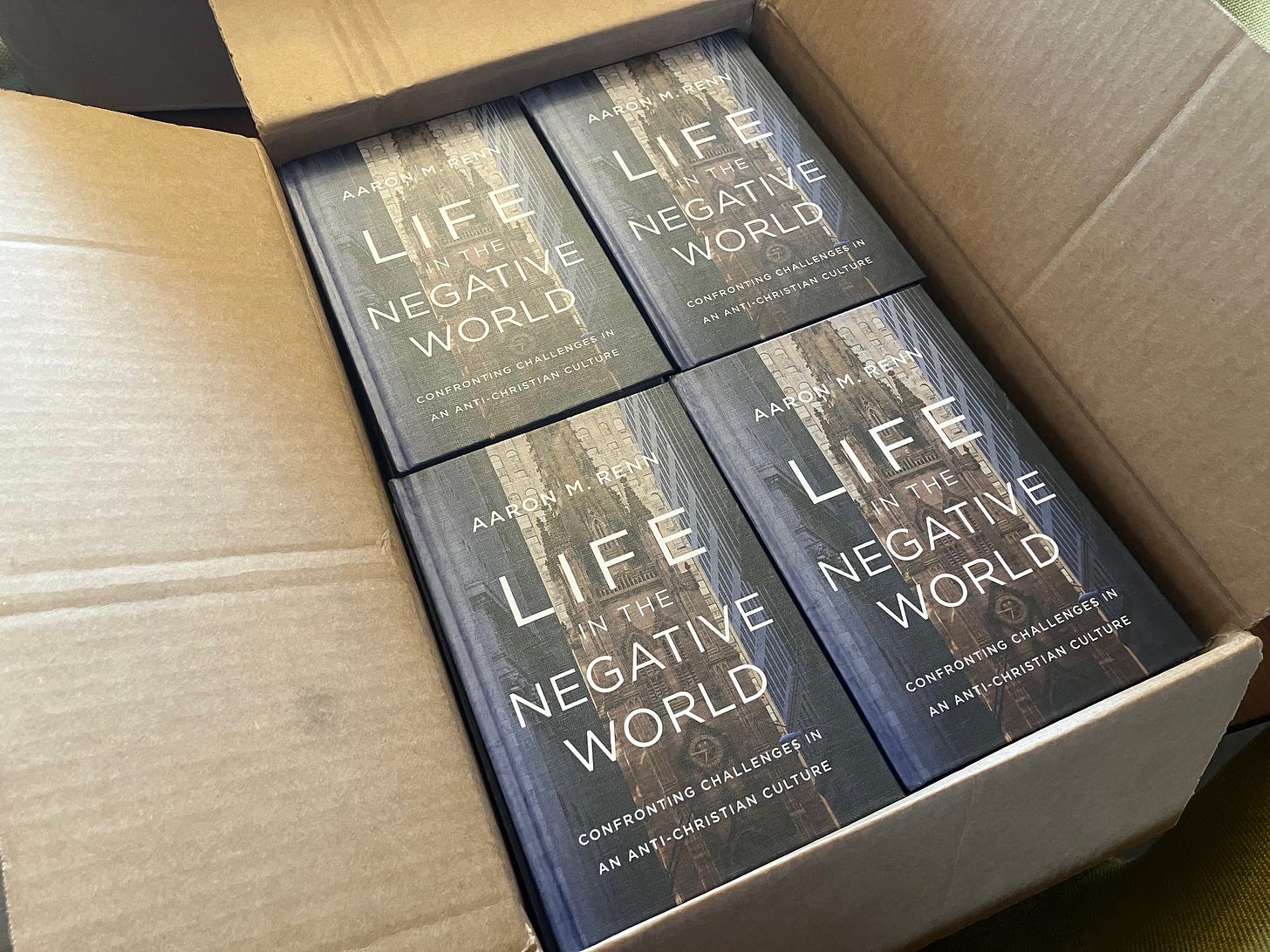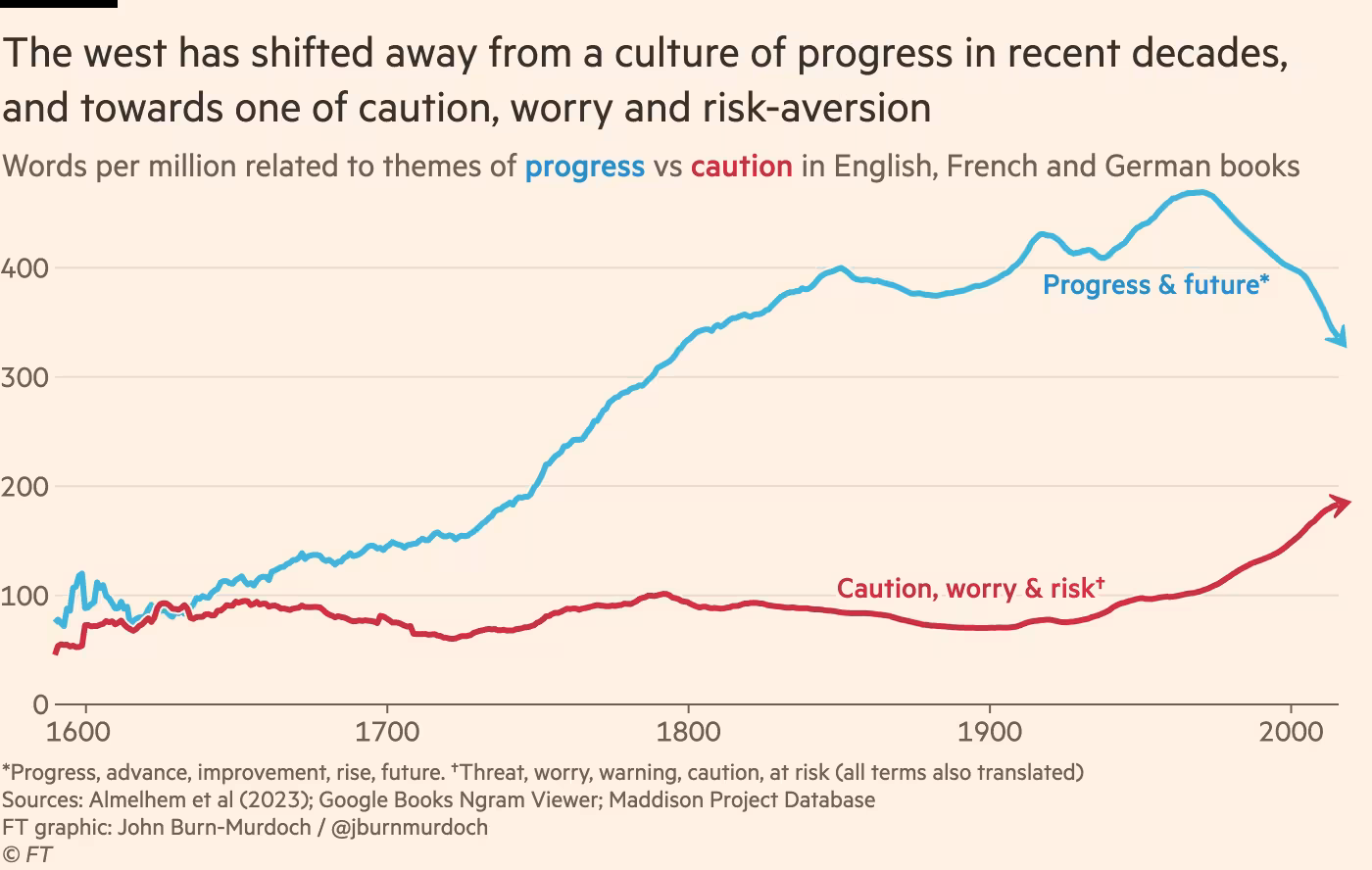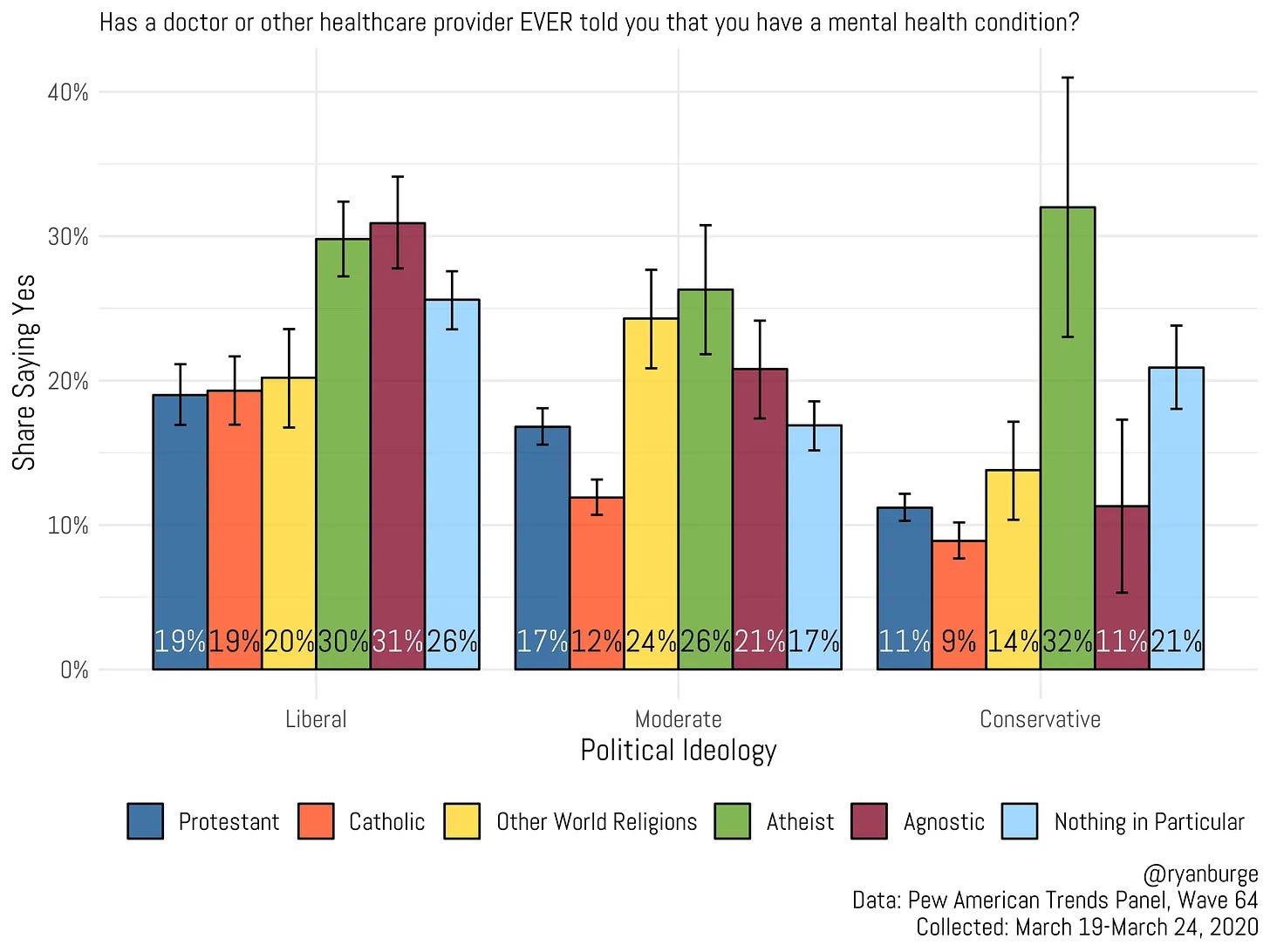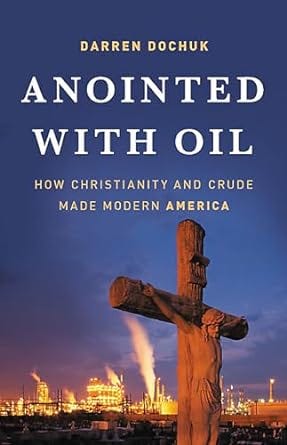Weekly Digest: The Car Dealer Mindset
The rise of pessimism, liberals and mental illness, Covid shutdown retrospectives, and more in this week's roundup
Welcome to my weekly digest for January 12, 2024, with the best articles from around the web and a roundup of my recent writings and appearances.
The publication of my new book Life in the Negative World: Confronting Challenges in an Anti-Christian Culture is starting to get real. I received my author copies this week and here’s the obligatory picture of me unboxing them.
Please do pre-order the book today, if you haven’t done so already, because pre-orders are critical to the book’s impact. Among other things, it helps determine how many copies retailers like Amazon order.
And, if you pre-order by January 29th, you can get special bonus material available for a limited time only. This includes a free e-book copy of my modern English translation of Mortification of Sin, and a graphic of the timeline of the three worlds, the three evangelical strategies, and key events. Just submit your purchase receipt to my publisher.
The Rise of Pessimism
The Financial Times had a story on a fascinating study showing that our language has been growing more pessimistic. Whereas at the time of the scientific and industrial revolutions there was a shift towards a language with more frequent use of terms related to progress, in recent years there’s been a shift towards words associated with caution, worry and risk.
Author John Burn-Murdoch writes:
They found a marked increase in the use of terms related to progress and innovation starting in the early 17th century. This supports the idea that “a cultural evolution in the attitudes towards the potential of science accounts in some part for the British industrial revolution and its economic take-off”.
…
Extending the same analysis to the present, a striking picture emerges: over the past 60 years the west has begun to shift away from the culture of progress, and towards one of caution, worry and risk-aversion, with economic growth slowing over the same period. The frequency of terms related to progress, improvement and the future has dropped by about 25 per cent since the 1960s, while those related to threats, risks and worries have become several times more common.
Click over to read the whole thing.
The Prestige Economy
James Patterson has a very interesting piece on the economy of university prestige at Law and Liberty. He contrasts two views of life and institutions, what he calls “car dealers” vs. “New Dealers.” It won’t be hard to guess which one he says conservatives are:
Over the past few years, I have become increasingly baffled at how little of this conservative commentators understand. Conservatives often joke about the irrelevance of higher education by quoting Sayre’s law, “The politics of the university are so intense because the stakes are so low.” Nothing could be further from the truth. Universities house scholars, whose work is both in research and the formation of students. If conservatives have no place in higher education, there will be no conservative scholarship and very few conservative students. Indeed, the falsehood of Sayre’s Law is evident in the intensity and coverage of the Magill and Gay fiascos. Conservatives understand that there is something at stake here, but they do not understand what it is. Let me explain.
…
The source of this ignorance is what I call the “Car Dealer vs. New Dealer problem.” Most American conservatives are middle class or aspire to the middle class, and, as a result, share a “car dealer” view of the world. The car dealer is a successful business owner. He is usually one of the wealthier people in town, and he makes other people rich too—by advertising on local media, hiring employees, and investing in local enterprises. To ensure success, the car dealer must constantly manage finances by finding new investment opportunities and cutting losses. That means gathering market data, firing underperforming staff, and seeking out innovation for increasing sales. The car dealer provides for the common good of those around him because of self-interest, and he assumes that others do the same. This worldview could not be worse for succeeding in higher education. Why is that? Car dealers cannot commit to anything in the long term. Short-term losses are signals to the car dealer that it is time to pull up stakes and minimize losses, and the costs imposed on those affected are simply part of how the world works.
…
The key to the New Deal approach of higher education is recognition that there are two economies at work. There is the financial economy and the prestige economy. The financial economy of the institution serves the prestige economy, and the prestige economy multiplies the financial returns at a much higher rate than the car dealer approach. There is an upper bound for what any institution can charge for tuition, but no such limit on donations from loyal alumni.
While not the primary focus of this piece, the car dealer vs. New Dealer dichotomy says something profound. Conservatives take a purely transactional, financial, ROI view of institutions, much as the owner of privately held small or medium sized business would. Liberals desire things well beyond that. That’s why the Sulzberger-Ochs family never has and never will sell the New York Times, no matter how much money there is in doing so. Silicon Valley has a different view as well, which is why Paul Graham says that the real message Silicon Valley sends to people is not that you should be richer but that you should be more powerful.
This is one reason why, although there are a large number of extremely wealthy conservatives, they punch well below their weight in their influence on society, whereas someone like George Soros is able to leverage his wealth into real change in the world.
Titus Techera also recently talked about this phenomenon.
My friend Joshua Steinman often talks about this same dichotomy, especially in his domain, tech startups, as “merchants v. aristocrats.” Steinman likes to compare Zuckerberg to a merchant, because he obeys elite opinion—cannot afford bad publicity—& gov’t agencies—the conditions of doing business; he likens Elon to an aristocrat because he asserts his will & makes enemies accordingly. Joshua brings out something Patterson rather leaves concealed, that you need pride & courage to achieve anything over the long term, because you need the trust of the public & the loyalty of your followers. Conservatives badly fail here because they either cannot find leaders who have such qualities or they cannot find projects that summon such leaders.
The merchant or car dealer mentality is great in many ways. We need people who think like that. But we also need people who think beyond it, who are driven by higher purposes.
Liberalism, Atheism, and Mental Illness
Liberals have the problems too. Ryan Burge has another series of fantastic charts showing that atheists are much more likely to be mentally ill than regular church attenders. The more regularly you attend religious services, the less likely you are to be mentally ill. And at equal levels of church attendance, Democrats are more likely to be mentally ill than Republicans.
It is interesting that conservative atheists show the highest level of mental illiness of all.
Covid Shutdowns in Retrospect
Nature: Global evidence on the economic effects of disease suppression during COVID-19
Our detailed policy analysis reveals that school closings, stay-at-home orders, and other economic restrictions were strongly associated with economic harm, but other non-pharmaceutical interventions—such as contact tracing, mass testing, and protections for the elderly were not.
Angie Schmitt, a good government liberal and transportation activist in Cleveland, wrote a powerful account of her experience school shutdowns as the mother of a young son, in response to a New Yorker piece about the large rise in chronic school absenteeism post-Covid. She writes:
The extent of the damage done here is absolutely astronomical. In Detroit, and some other places, they’re now paying private contractors to visit parents of chronically absent students at their home and try to coax them back to school.
…
It is a giant mess. I’m really angry and concerned about all this. Not just angry that we’re in this position, but that we seem to care so little (and by “we” I guess I mean more privileged people who dominate “the discourse” or anyone who’s in a position to do something about it, respond appropriately). These school closures did tremendous damage to our education system. And now it seems like we’d rather just ignore it than face what we’ve done.
…
I — happily! — voted to pass four levies since I’ve lived in the city and I have to say, my confidence in the district and that it would make good use of the money is not high right now. I feel burned and like the district can’t be trusted to uphold its mission. It’s a feeling I came by honestly and painfully.
…
I will never forget it. I don’t think the kids will either, even if Twitter’s most self righteous PhD holders haven’t given it a second thought (I can verify that).
As I’ve said many times, the Covid school shutdowns have likely added untold thousands of vuleranable kids to the school-to-prison pipeline.
NY Post/MSN: COVID ‘6-feet’ social distancing ‘sort of just appeared,’ likely lacked scientific basis, Fauci admits
Dr. Anthony Fauci admitted to Congress on Tuesday that guidelines during the pandemic to slow the spread of COVID-19 by keeping six feet of separation “sort of just appeared.” Fauci, 83, revealed to the House Select Subcommittee on the Coronavirus Pandemic the “six feet apart” recommendation was “likely not based on scientific data,” said Chairman Brad Wenstrup.
As left wing pundit Matthew Yglesias put it: “We really should have had some kind of bipartisan commission to look back at the federal Covid response.”
That’s not likely to happen. My belief is that we are going to treat the two years of Covid shutdowns and such as a classic moral panic, and tacitly agree to a collective amnesia about what happened.
None of the people responsible will ever have to give an account or pay a real prices for their mistakes. And by and large they are still running things.
Best of the Web
Politico: Why Is the Pundit Class Suddenly So Marriage-Obsessed?
Institute for Family Studies: The Resurgence of the Two-Parent Family
Leila Mechoui/Compact: How Parenting Became a Lifestyle
This dislodging of parenting from the broader social context in which it occurs is the latest symptom of a modern paradigm shift. Throughout most of human history, the rearing of children was subservient to the needs and aims of the social unit; a well-raised child was one who contributed to the collective. Parenting was part and parcel of the regulation of behavior.
…
Lacking a firm ethical or scientific core, parenting tends to become an aesthetic practice. Babywearing has made a comeback (to enhance “attachment”), 4-year-olds are breastfed, children are given therapy sessions in the event of a tantrum, “big feelings” are “given space.” Individual parents are left with the impression that they are able to select an individualized and “evidence-based” approach suited to their and their children’s inclinations, meaning that parenting resembles the selection of a mass-marketed product.
Josh Barro: Universities Are Not on the Level
Less discussed is the fact that public confidence in colleges has fallen significantly across all ideological groups since 2015. Though Republicans’ confidence cratered the most, Gallup found that it fell by 16 points among independents and 9 points among Democrats.
Often, when an issue becomes polarized, you’ll see thermostatic effects in public opinion, as when Democrats became more liberal on immigration in response to Donald Trump’s histrionic attacks on immigrants. But while liberal figures on campus like to talk about themselves as a vanguard in a fight against conservative know-nothings who would take down knowledge and expertise, there is no pro-college backlash among liberals that is apparent in the polls. So it would behoove the champions of knowledge and research and expertise and truth at our nation’s elite universities to be a little less entitled and whiny, and a little more introspective about why everyone seems to like them less than they used to.
NYT: Trump Is Connecting With a Different Type of Evangelical Voter - This article hits at a point I’ve made multiple times in the past. You have to distinguish between religious evangelicals (regular church attenders) and cultural evangelicals (rarely go to church). It is the latter who are the big Trump voting base.
New Content and Media Mentions
I was mentioned this week by Dominick Baruffi, Paul Caron, and Emma Waters.
I was also a guest on Allie Beth Stuckey’s Relatable podcast talking about my new book. It was a great conversation, and it got great feedback in the comments.
On my own podcast this week my guest was Notre Dame professor Darren Dochuck, who talked about his landmark book Anointed With Oil: How Christianity and Crude Made Modern America. Note that due to an error on my end, my volume is too low in this podcast.
Paid subscribers can read the transcript.
You can subscribe to my podcast on Apple, Spotify, or YouTube.
People often ask me for book recommendations. I struggle with that because even the books that have influenced me the most are often either very difficult reads or flawed in important ways. But here’s a one for you. Read Anointed With Oil. It comes with my highest recommendation. It’s not light reading, but it’s definitely mind expanding.
New this week:
Why RETVRN Is Not a Solution - The American right needs to have a forward-looking vision for America. Plus, what effective altruism and faithful presence have in common.
Beauty Is Not Just in the Eye of the Beholder - Four factors that control what we find and say is beautiful









I have to disagree with the idea of the Car Dealer mindset. Many institutions began with a conservative and Christian focus - Harvard, Yale, Princeton to name just a few. But akin to the second law of thermodynamics, conservative organizations become liberal over time - and in fact force conservatives out. That’s why conservatives start new organizations not because they think they are worthless but because they are wasting time and resources trying to reform them. My goodness, that was the whole point of the Reformation. The Roman Catholic Church resisted true reform for decades if not centuries.
Today there are sprouts of conservative Christian universities such as Hillsdale that are rebuilding to eventually compete with those apostate organizations.
Paul Weyrich said it best when he was accused of telling Christians to abandon politics. We should start a counter culture but keep our hands in politics so the left would not use power of the state to destroy us.
Good luck with the book Aaron. I look forward to getting a copy.